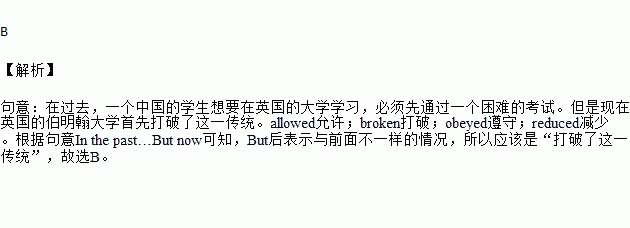题目内容
In the past, a Chinese student who wanted to study at a university in the UK had to pass a difficult exam. But now, the University of Birmingham has firstly __________ the tradition.
A.allowed B.broken C.obeyed D.reduced
练习册系列答案
 课堂全解字词句段篇章系列答案
课堂全解字词句段篇章系列答案 步步高口算题卡系列答案
步步高口算题卡系列答案 点睛新教材全能解读系列答案
点睛新教材全能解读系列答案
相关题目


